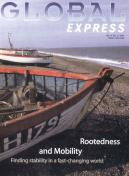 |
THE HUMAN SIDE OF
THE HUMAN SIDE OF
GLOBALISATION
Beirut smells of jasmine and petrol
Since the time of the Phoenician traders, Lebanon has been known as a place where East and West meet, the passport to the Orient, the Paris of the Middle East. Today it is a country struggling to defy its history and to rebuild itself, both physically and metaphorically, after years of conflict. In central Beirut, the bullet-ridden, bombed-out shells of buildings teeter alongside glass offices and wide new streets—the destruction of war continues to have a place in the mental landscape of the Lebanese today.
I am here with the British-Arab University Association (BAUA), with five other British students, united by a desire to move beyond media representations and see Lebanon for ourselves. We are hosted by a range of Lebanese, many of whom have come to Britain on BAUA exchanges in the past. Every day is stretched to its limits (or rather ours), with discussions, meetings and food. Our first afternoon finds us drinking dark coffee in a Beirut drawing room, listening to ‘people who know’—like Mounah El-Solh, a leading political thinker—talk about the war, Iraq and party politics. It is election time and the dignified drawing-room politics is interspersed with the sounds of horns and shouts from the streets. A couple of blocks down, a plaza fills with supporters; it is more Westlife than Westminster, a heady mix of pop politics under a crescent moon. ‘You reserve this kind of spectacle for the Spice Girls’, says Mounah’s son, a journalist, ‘here it is our politics’. As the trip continues, we find ourselves in the heavily-guarded offices of Sheikh Mohammed Hussein Fadlallah, a prominent Shiite cleric close to Hizbollah and one of the proponents of inter-religious dialogue in Lebanon. Later, we’re at the border to Southern Lebanon, until recently occupied by Israel, where war has never felt so close. All the time we’re learning—whether it be about gender and Islam, Sufism, political history, the way the West’s role is experienced in the Middle East, or how to make a good taboulleh salad.
The BAUA trip, however, is more than a cultural package holiday. It is not just a fast track to understanding Lebanon’s complex social and political situation, nor a process of one-sided cultural absorption on our part. It is a process of exchange and self-reflection. Everywhere we go we are accompanied by our new friends: Lebanese enter Palestinian refugee camps for the first time, Christians stay in Muslim villages in the South. This is an intra- as well as an international exchange.
It is these friendships, both with the Lebanese and between them, which are the treasures of the trip. They represent a small but important step in promoting a humanitarian globalism. Many of the Lebanese we meet, Muslims and Christians alike, speak negatively of the phenomenon of globalisation, perceiving it as a political and economic project which furthers the needs of a few at the expense of the many. They speak of the need for an internationalism based on equality and dialogue, for the globalisation of human relations as a necessary counterpart to economic globalisation. As a long-term investment in human relations, the BAUA exchanges are a rare and valuable thing.
Our last night sees us in a big circle with most of the people we’ve met, stumbling through the Dubki (a traditional Lebanese dance). I look around, and realise that every religious group in Lebanon is represented here, holding hands and dancing It’s unreal, like a child’s picture or a folk song. It doesn’t exist outside of this hotel lobby, but right here, right now, is a microcosm of the kind of world I want to live in.
Ella Saltmarsh, UK
Ella’s visit to Lebanon took place in September 2000. BAUA has, since 1973, conducted exchanges with Arab universities, with the aim of establishing firm links of trust and respect between students in Arab countries and those in the West. The conviction underlying its programme is that the Islamic and Christian cultures share, with others, values on which trust can be built. For more information, e-mail: info@baua.org.uk.
|













